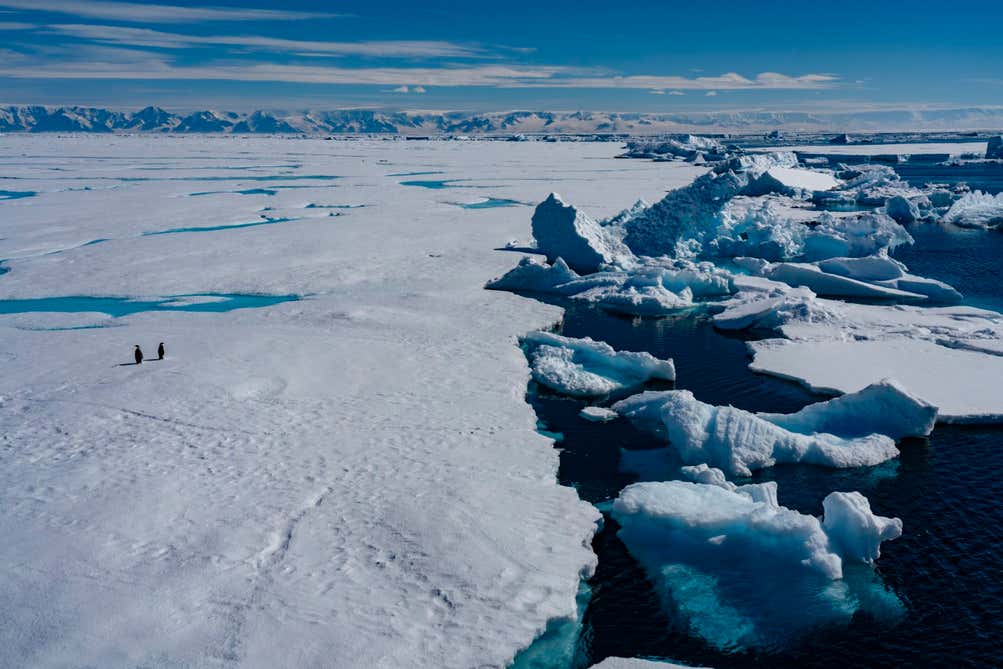
You know how, when you remove a weight from an elastic surface, it rebounds upwards? Now imagine that this surface is the size of a continent. This is what is happening in Antarctica. As the ice melts, the land beneath it rises. This « rebound, » according to geophysical analysis, could change everything we thought we knew about the future of our oceans.
This process, known as post-glacial rebound, is occurring in Antarctica at an astonishing rate. According to a new study published in Science Advances (link provided here), this phenomenon could have a significant impact on future sea level rise predictions.
The Importance of Antarctic Geophysics
Dr. Natalya Gomez, a glaciologist at McGill University, highlights the importance of understanding this phenomenon: « With nearly 700 million people living in coastal areas and the potential cost of sea level rise reaching billions of dollars by the end of the century, understanding the domino effect of Antarctic ice melt is crucial. »
The research team examined the Earth’s mantle beneath the Antarctic ice sheet and found that it is particularly « soft » in certain key areas. This high viscosity is causing the land to rise quite rapidly.

A Surprisingly Rapid Rate of Change
Professor Terry Wilson, a geologist at Ohio State University, explains:
“Our measurements show that the solid land beneath the Antarctic ice sheet is changing shape remarkably quickly. The land uplift due to the reduction in surface ice is happening over decades rather than thousands of years.”
Researchers used 3D models to simulate sea level rise due to changes in the mass of the Antarctic land under various scenarios. If climate warming remains modest, Antarctica could contribute to a sea level rise of up to 1.7 meters by 2500. However, if global warming continues unabated, this figure could reach 19.5 meters.
Cities such as Shanghai, Mumbai, New York, Amsterdam, and our Venice would be submerged.

The Delicate Balance Between Melting and Uplift
Professor Rob DeConto, a glaciologist at the University of Massachusetts, explains that when the retreat of the ice sheet exceeds the rate of land uplift, more water is expelled into the oceans. However, if we manage to slow this melting, the uplift of the land will cause some of the ice in the warmer ocean waters to be stored longer.
It is important to note that the impact of sea level rise will not be uniform across the globe. Due to gravitational, rotational, and geological peculiarities, different parts of the planet will experience unique effects.
Climate Injustice
Gomez and her team highlight an aspect of climate injustice revealed by geophysical analysis:
“Low-latitude islands and coastal sites already experiencing sea level rise will see an above-average increase due to Antarctic ice melt, regardless of the ice melt scenario. This highlights the climate injustice faced by countries with low emissions but high exposure and vulnerability to sea level rise.”
The Need for More Accurate Predictions
Researchers caution that there are still many uncertainties in the model, notably due to a lack of seismic data on West Antarctica. Additionally, these estimates do not account for ice changes in Greenland and the world’s mountain ranges.
Professor Wilson emphasizes the importance of continuing to improve our ability to make more accurate predictions: “This is the only way we can meaningfully address our future.”
Nonetheless, the effects of sea level rise are already visible in some parts of the world. For example, in the Kiribati Islands, villages are struggling against the advancing ocean with sandbags, which are often washed away, causing flooding and salt contamination of soils and water sources.
Future Antarctic Geophysics: Conclusion and Future Outlook
Gomez and her colleagues conclude that reducing greenhouse gas emissions will allow the solid Earth rebound to play a more significant role in preserving a greater portion of the Antarctic ice sheets, thereby mitigating the most severe and inequitable impacts of future climate change on global coastlines.
This research not only sheds new light on the complex interaction between geophysics and climate change but also underscores the urgent need for global action to mitigate the effects of global warming. The future of our planet and its coastlines hinges on the decisions we make today.
Source : futuroprossimo



